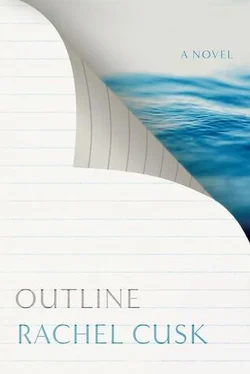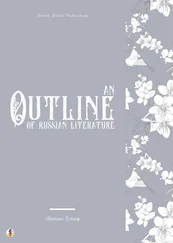He offered me a Coke from the coldbox he kept on deck, and then proffered a box of tissues, from which he took a large handful himself. He blew his nose lengthily and thoroughly, while both of us watched the family on the neighbouring boat. There were two little boys and a girl playing there, shrieking as they leapt off the side and then clambering one after another back up the ladder, their bodies glittering with water. A woman in a sunhat sat on deck, reading a book, and beside her in the shade of the canopy was a baby’s pram. A man in long shorts and sunglasses paced up and down the deck, speaking into his phone. I said that I found appearances more bewildering and tormenting now than at any previous point in my life. It was as if I had lost some special capacity to filter my own perceptions, one that I had only become aware of once it was no longer there, like a missing pane of glass in a window that allows the wind and rain to come rushing through unchecked. In much the same way I felt exposed to what I saw, discomfited by it. I thought often of the chapter in Wuthering Heights where Heathcliff and Cathy stare from the dark garden through the windows of the Lintons’ drawing room and watch the brightly lit family scene inside. What is fatal in that vision is its subjectivity: looking through the window the two of them see different things, Heathcliff what he fears and hates and Cathy what she desires and feels deprived of. But neither of them can see things as they really are. And likewise I was beginning to see my own fears and desires manifested outside myself, was beginning to see in other people’s lives a commentary on my own. When I looked at the family on the boat, I saw a vision of what I no longer had: I saw something, in other words, that wasn’t there. Those people were living in their moment, and though I could see it I could no more return to that moment than I could walk across the water that separated us. And of those two ways of living — living in the moment and living outside it — which was the more real?
Appearances, my neighbour replied, were highly valued in his own family, but he had learned — perhaps fatally — to view them as a mechanism of deception and disguise. And it was in the closest relationships that the deception had to be greatest, for obvious reasons. He knew, for instance, that many of the men of his experience — his uncles, and people of their social circle — had a series of mistresses while remaining married to one woman all their lives. But it had never occurred to him that his father might have sustained his relationship to his mother in the same way. He perceived his father and mother as unitary while his uncle Theo, for instance, he knew to be duplicitous, though he wondered more and more whether that distinction had actually existed; whether, in other words, he had spent his adult life attempting to follow a template of marriage that had been, in fact, an illusion.
There had been a hotel Theo liked to stay in, not far from my neighbour’s boarding school, and Theo would often call in and take him out to tea, always with a different ‘friend’ in tow. These friends were as scented and beautiful as aunt Irini was swarthy and squat; she had a number of warts on her face that sprouted coarse black hairs of an extraordinary girth and length, and my neighbour had been mesmerised his whole life by this feature, which was still real to him though Irini had been dead for thirty years and which symbolised the enduring nature of repulsion, while beauty was seen once and never seen again. When Irini died, at the age of eighty-four after sixty-three years of marriage, uncle Theo refused to allow her to be buried and instead had her encased in glass and kept in the vaults of a Greek chapel in Enfield, where he visited her every day of the six months that remained to him. My neighbour had never kept company with Theo and Irini without witnessing scenes of the most extraordinary violence: even a telephone call to the house usually involved an argument, with one of them picking up the extension to abuse the other while the caller played referee. His own parents, though fiercely combative, never approached the heights of Theo and his wife — theirs was a colder though perhaps a bitterer war. It was his father who died first, in London, and his body was stored in the same vault where Irini had lain, for his mother had taken it into her head to commission the construction of a family tomb back on the island, an undertaking so grandiose that it had fallen well behind schedule and was not ready to receive him when he died. She had conceived this idea when his father first fell ill, and the last year of his father’s life was spent receiving almost daily bulletins on the progress of the tomb being built to envelop him. This unique method of torture might have seemed to be the conclusive move in their lifelong argument, but in fact when his mother herself came to die — a year to the day, as he believed he had already told me, after his father — the tomb was still not finished. She joined her husband in the vault in Enfield, and it wasn’t until several months later that their bodies were flown together back to the island on which both of them had been born. It had fallen to my neighbour to oversee the interring, and also the exhumation of other family members — his grandparents on both sides, numerous uncles and aunts — from their places in the cemetery and their relocation in the enormous new tomb. He flew back, with his parents’ corpses in the hold, and spent all day immersed with the gravediggers in the grisly business of transporting and arranging the various coffins. He was particularly unnerved to witness the return to the earth’s surface of his grandfather, his mother’s father, who had been a man of great mischief and the cause — to the end of their days — of many of his parents’ arguments, for the power even in memory that he continued to hold over his daughter. In the late afternoon, his parents were the last to be lowered into the vast marble structure. My neighbour had a taxi waiting to take him back to the airport, as he was due to return to London straight away. But midway through the journey, sitting in the taxi, a terrible realisation struck him. In all the rearranging of the family bodies, he had somehow failed to place his parents side by side: worse still, he distinctly recalled, there in the back of the taxi, that it was his grandfather’s coffin that lay between the two. Immediately he ordered the taxi driver to turn around and take him back to the cemetery. As they approached, he told the taxi driver that he would have to help him, for by now it was nearly dark and everyone else would have gone home. The taxi driver agreed, but no sooner had they entered the cemetery gates in the darkness than he took fright and ran away, leaving my neighbour alone. He did not recall, my neighbour said, quite how he managed to unseal the tomb single-handed: he was still a fairly young man, but even so he must have been endowed in that moment with a superhuman strength. He climbed over the edge and descended into the tomb and there, sure enough, he saw his parents’ two coffins with the grandfather between them. It was not so hard to slide them into their proper positions, but once he’d done it he realised that owing to the steepness and depth of the tomb it was going to be impossible for him to get out again. He called and shouted, to no avail; he leapt and scrabbled at the smooth sides of the tomb, trying to find a foothold.
But I suppose I must have got out somehow, he said, because I certainly didn’t spend all night there, though I thought I might have to. Perhaps the taxi driver came back after all — I don’t remember. He smiled, and for a while the two of us watched the family on the other boat, across the bright water. I said that when my sons were the ages of those two leaping boys, they were so intimate it would have been hard to disentangle their separate natures. They used to play together without pause from the moment they opened their eyes in the morning to the moment they closed them again. Their play was a kind of shared trance in which they created whole imaginary worlds, and they were forever involved in games and projects whose planning and execution were as real to them as they were invisible to everyone else: sometimes I would move or throw away some apparently inconsequential item, only to be told that it was a sacred prop in the ongoing make-believe, a narrative which seemed to run like a magic river through our household, inexhaustible, and which they could exit and re-enter at will, moving over that threshold which no one else could see into another element. And then one day the river dried up: their shared world of imagination ceased, and the reason was that one of them — I can’t even recall which one it was — stopped believing in it. In other words, it was nobody’s fault; but all the same it was brought home to me how much of what was beautiful in their lives was the result of a shared vision of things that strictly speaking could not have been said to exist.
Читать дальше












